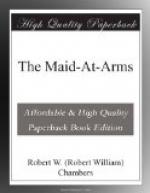He gave me a cunning look, pushed his wig partly straight, and lay back, puffing quietly at his pipe.
I hesitated, choosing my words ere I spoke; and at first he listened contentedly, nodding approval, and pushing fresh tobacco into his clay with a fat forefinger.
I pointed out that it was my desire to save my lands from ravage, ruin, and ultimate confiscation by the victors; that for this reason he had summoned me, and I had come to confer with him and with other branches of our family, seeking how best this might be done.
I reminded him that, from his letters to me, I had acquired a fair knowledge of the estates endangered; that I understood that Sir John Johnson owned enormous tracts in Tryon County which his great father, Sir William, had left him when he died; that Colonel Claus, Guy Johnson, the Butlers, father and son, and the Varicks, all held estates of greatest value; and that these estates were menaced, now by Tory, now by rebel, and the lords of these broad manors were alternately solicited and threatened by the warring factions now so bloodily embroiled.
“We Ormonds can comprehend your dismay, your distress, your doubts,” I said. “Our indigo grows almost within gunshot of the British outpost at New Smyrna; our oranges, our lemons, our cane, our cotton, must wither at a blast from the cannon of Saint Augustine. The rebels in Georgia threaten us, the Tories at Pensacola warn us, the Seminoles are gathering, the Minorcans are arming, the blacks in the Carolinas watch us, and the British regiments at Augustine are all itching to ravage and plunder and drive us into the sea if we declare not for the King who pays them.”
Sir Lupus nodded, winked, and fell to slicing tobacco with a small, gold knife.
“We’re all Quakers in these days—eh, George? We can’t fight—no, we really can’t! It’s wrong, George,—oh, very wrong.” And he fell a-chuckling, so that his paunch shook like a jelly.
“I think you do not understand me,” I said.
He looked up quickly.
“We Ormonds are only waiting to draw sword.”
“Draw sword!” he cried. “What d’ye mean?”
“I mean that, once convinced our honor demands it, we cannot choose but draw.”
“Don’t be an ass!” he shouted. “Have I not told you that there’s no honor in this bloody squabble? Lord save the lad, he’s mad as Walter Butler!”
“Sir Lupus,” I said, angrily, “is a man an ass to defend his own land?”
“He is when it’s not necessary! Lie snug; nobody is going to harm you. Lie snug, with both arms around your own land.”
“I meant my own native land, not the miserable acres my slaves plant to feed and clothe me.”
He glared, twisting his long pipe till the stem broke short.
“Well, which land do you mean to defend, England or these colonies?” he asked, staring.
“That is what I desire to learn, sir,” I said, respectfully. “That is why I came North. With us in Florida, all is, so far, faction and jealousy, selfish intrigue and prejudiced dispute. The truth, the vital truth, is obscured; the right is hidden in a petty storm where local tyrants fill the air with dust, striving each to blind the other.”




